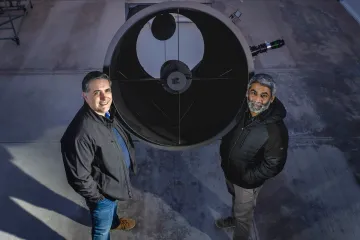In Safe Orbit
The Space4 Center, a Partnership Among Four UArizona Colleges and Units, Focuses on Sustainability and Security Just Beyond Earth.

Adobe Stock Image
The orbital space around Earth is increasingly congested, contested and competitive. The University of Arizona’s newly established Space4 Center is developing research and education solutions to ensure that use of orbital space remains safe, secure and sustainable for decades to come.
The “4” in the center’s name — which represents the four s’s of “space safety, security and sustainability” — also reflects the four original university partners that came together to form the center: the College of Science, College of Engineering, BIO5 Institute and Office of Research, Innovation and Impact
“The University of Arizona has a moonshot culture. That is, we have permission to think big, take risks and courageously address the world’s most complex problems,” says Betsy Cantwell, UArizona senior vice president for research and innovation. “Challenges related to national security and sustainability in space are certainly a moonshot, and they will not be solved by any single unit or college. Space4 is laying the groundwork to do ambitious, groundbreaking things in a rapidly changing field.”

Roberto Furfaro and Vishnu Reddy
College of Engineering photo
The center is led by Director Vishnu Reddy; Deputy Director for Engineering Roberto Furfaro ’04; Deputy Director for Data Science Nirav Merchant ’94, who also leads the university’s Data Science Institute and the National Science Foundation-funded CyVerse platform; and Deputy Director for Community Engagement Walt Harris.
“The university has a strong legacy of detecting and tracking moving objects that goes back 50 years. Over the last five years, we have built a world-class academic space domain awareness program supporting the U.S. military,” Reddy says. “The Space4 Center will build upon these to address grand challenges in space safety, security and sustainability.”
Between 20,000 and 100,000 new satellites are forecast to be launched into space over the next decade, potentially creating a major traffic jam in space if not managed in a sustainable way, Reddy says.
Earlier this year, Reddy, a professor of planetary sciences, and Furfaro, a professor of systems and industrial engineering, received $7.5 million from the U.S. Air Force Research Lab to develop ways to detect, characterize and track objects in cislunar space, or the space between Earth and the moon.
The university also operates a Space Domain Awareness Observatory complex, located near Biosphere 2. Reddy, Furfaro and Merchant are longstanding collaborators who, as part of a cooperative agreement with the U.S. Air Force, developed VerSSA, an extension of CyVerse’s computational infrastructure focused on space domain awareness.
“The algorithms we develop using machine learning and artificial intelligence will be a game-changer in tackling the space domain awareness problem. We have the perfect combination of hardware that is collecting exquisite data and cyberinfrastructure to harness the power of AI at the university,” Furfaro says.
Much of Space4’s focus is on expanding the university’s strengths by bringing additional interdisciplinary expertise and resources into the fold. Creating a legal framework for operators in space, for example, is central to the future of space exploration. Space4 will collaborate with Andrew Keane Woods, professor of law, to develop a first-of-its-kind executive course in space law at UArizona.
The course will be offered to UArizona students and industry leaders in collaboration with the university’s Washington, D.C., Center for Outreach and Collaboration. UArizona President Robert C. Robbins, meanwhile, recently signed a memorandum of understanding with the University of Western Australia, creating a formal collaborative partnership between two universities with unparalleled expertise in orbital space.
“The University of Arizona has a long legacy of success in the space sciences, and I am excited to see how we will build upon those strengths with Space4 as we unite our experts across disciplines,” Robbins says. “This new center will have a profound impact on an increasingly important strategic priority for our future. I am so glad to see the university leading research into orbital space security and sustainability, and I look forward to seeing what it will achieve.”
